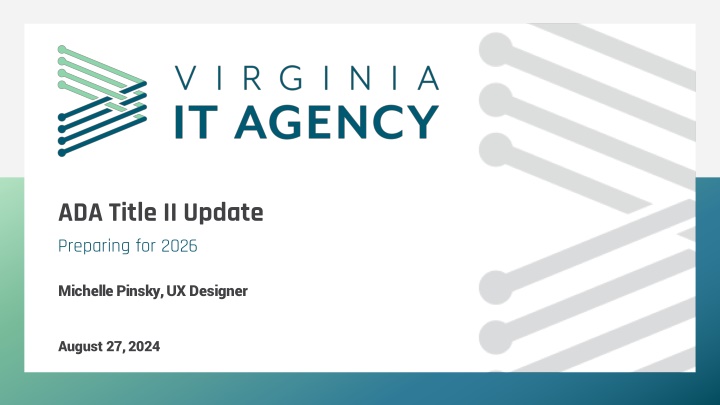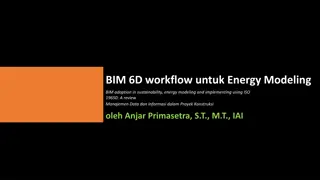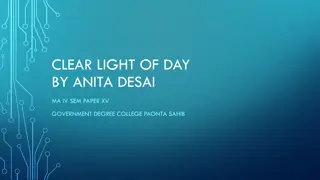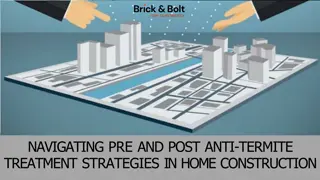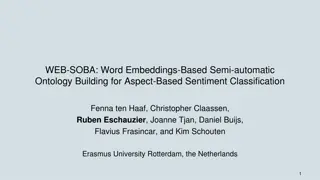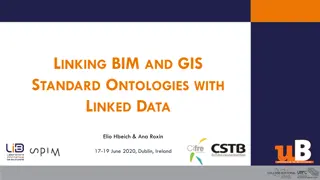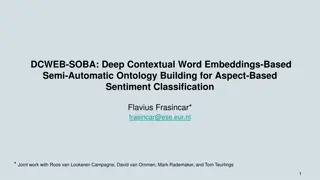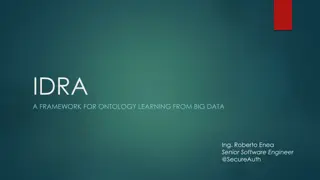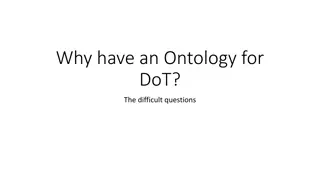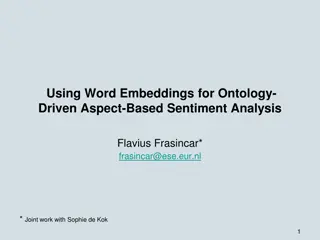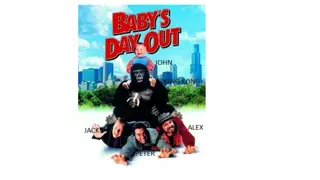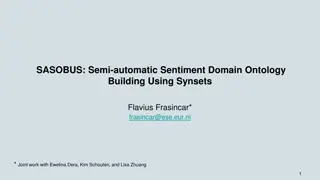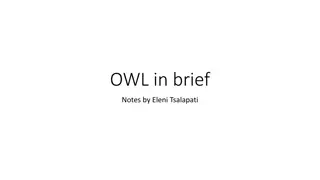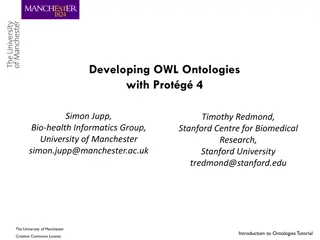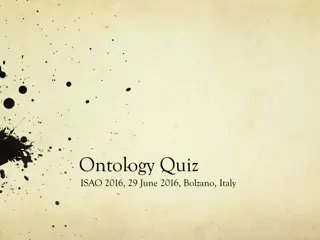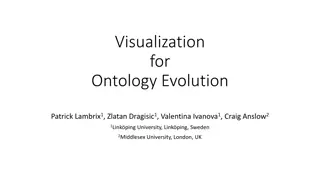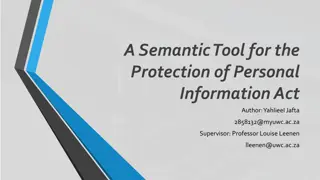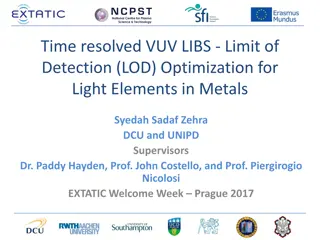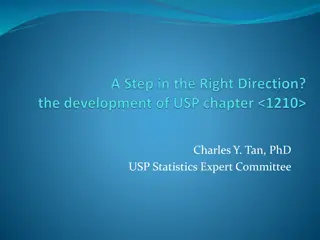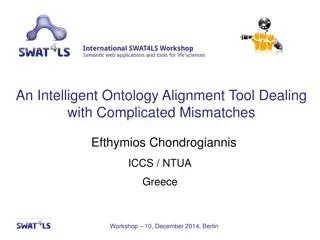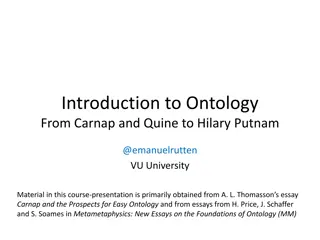Ontology Approach for LOD-Sensitive BIM Data Management
A comprehensive exploration of the Ontology Approach for LOD-sensitive BIM data management in the Architecture, Engineering, and Construction industry. This study delves into the importance of LOD concepts, flexible data requirements, and the collaborative environment for optimized building design.
Download Presentation

Please find below an Image/Link to download the presentation.
The content on the website is provided AS IS for your information and personal use only. It may not be sold, licensed, or shared on other websites without obtaining consent from the author.If you encounter any issues during the download, it is possible that the publisher has removed the file from their server.
You are allowed to download the files provided on this website for personal or commercial use, subject to the condition that they are used lawfully. All files are the property of their respective owners.
The content on the website is provided AS IS for your information and personal use only. It may not be sold, licensed, or shared on other websites without obtaining consent from the author.
E N D
Presentation Transcript
IMAGE ADA Title II Update Preparing for 2026 Michelle Pinsky, UX Designer August 27, 2024
If you attend no other seminar, you need to attend this one (No, really!)
What this seminar covers (Or what we're hoping to cover in this time block)
5 Agenda Introduction The Update What does the update cover? What this seminar covers How long do I have to comply? Why this is the most important seminar so far What is ADA Title II? Do I really need to comply? t Exceptions What is it? Am I excepted? The history What if I'm unsure? What it covers Q&A vita.virginia.gov vita.virginia.gov
So let's get started... What is the ADA Title II?
What is it? 7 The Americans with Disabilities Act (ADA) is a federal civil rights law that prohibits discrimination against people with disabilities in everyday activities. It guarantees that people with disabilities have the same opportunities as everyone else, such as employment opportunities, purchasing goods and services, and participating in government programs (federal, state, and local). vita.virginia.gov
What is it? 8 A person by the ADA if they have: A physical or mental impairment that substantially limits one or more major life activities Has a history or record of an aforementioned impairment Is perceived by others of having an aforementioned impairment A major life activity is defined as: Activities that you do every day, including someone's own internal processes. vita.virginia.gov
The history 9 The ADA is still a relatively young act, signed into law by President George H.W. Bush on July 26, 1990. This means the law is only 34 years old! An amendment (The ADA Amendments Act of 2008) expanded the definition of "disability" to protect a greater variety of people. It was created as further supplementation of other disability rights laws as part of a greater disability rights movement in the United States in the 1980's. Some laws that came before it and that the ADA was created to support include: The Rehabilitation Act of 1973 And specifically Section 504 of that act The ADA was created to cover more aspects of American life these acts did not cover, as well as other services that citizens would access that did not receive federal funding (such as doctors' offices). vita.virginia.gov
What it covers 10 There are five different sections in the ADA, but we will specifically focus on Title II. Title II specifically calls out digital accessibility for governments by stating: "Title II of the ADA prohibits discrimination against people with disabilities in all services, programs, and activities of state and local governments. State and local governments must take steps to ensure that their communications with people with disabilities are as effective as their communications with others. For these reasons, the Department has consistently taken the position that the ADA s requirements apply to all the services, programs, or activities of state and local governments, including those offered on the web." This includes any product, service, program or activity governments offer including built environments. It is enforced by consumers (users) filing formal complaints. You can learn more by visiting ADA.gov. (It is strongly encouraged state employees working in digital content give this page a read.) vita.virginia.gov
What is the update? 12 Title II now mandates that state and local governments make their web content and mobile applications accessible to people with disabilities based on WCAG 2.1 AA standards by April 24, 2026. This update was published on April 24, 2024 by the Department of Justice. This update sets a specific technical standard that state and local governments must follow in order to meet their existing obligations under Title II. This rule applies to web content and applications that a state or local government provides or makes available, including content made by a third-party vendor contracted by the government. This rule applies to content and applications that are both public-facing and internal-facing. vita.virginia.gov
How long do I have to comply? 13 State and local governments have within 2 or 3 years of when the rule was published on April 24, 2024 depending on their population size. School districts are not special district governments. City school districts would use their population size of their city to know when to comply. County districts would use their county population size, etc. If the school district is an independent one, it would use the population estimate in the most recent Small Area Income and Poverty Estimates. Universities and colleges are NOT EXEMPT and would fall under state and local government population size levels to know when to comply. State & local government pop. size Compliance date 0 to 49,999 persons April 26, 2027 Special district governments April 26, 2027 50,000 or more persons April 24, 2026 vita.virginia.gov
Do I really need to comply? 14 YES, NO EXCEPTION (Well, kind of) vita.virginia.gov
Archived web content 16 Archived web content must meet ALL these criteria to be considered exempt: 1. The content was created before the date the state or local government must comply with this rule, or reproduces paper documents or the contents of other physical media that were created before the government must comply with this rule,AND 2. The content is kept only for reference, research, or recordkeeping,AND 3. The content is kept in a special area for archived content,AND 4. The content has not been changed since it was archived. This exception does not change the fact that state and local governments have to provide effective communication and reasonable modifications and equal opportunities to participate in their services, programs and activities. Example: If a person with a hearing disability requests access to a city s video that is archived, one way that the city could provide effective communication to the person is by adding captions to the video and sharing a copy of the captioned video file with the person. vita.virginia.gov
Pre-existing conventional electronic documents 17 Documents that meet both of the following points usually do not need to meet WCAG 2.1, Level AA, except in some situations: 1.The documents are word processing, presentation, PDF, or spreadsheet files; AND 2.They were available on the state or local government s website or mobile app before the date the state or local government must comply with this rule. Documents that are currently being used to apply for, access, or participate in a state or local government s services, programs, or activities do not fall under the exception even if the documents were posted before the date the government must comply with the rule. Example: A state posted a PDF version of a business license application on its website in 2020. Members of the public still use that PDF to apply for a business license after the date the state has to comply with the rule. The exception would not apply to the application and it would usually need to meet WCAG 2.1, Level AA. vita.virginia.gov
Content posted by a third-party where the third-party is not contracted by a public entity 18 Content posted by a third party where the third party is not posting due to contractual, licensing, or other arrangements with a public entity. Example: A message that a member of the public posts on a town s online message board would probably fall under the exception. Content posted or created by state or local or a state or local government's contractor or vendor IS NOT EXEMPT. Example: If a state or local government uses a company to design, manage, or update its website, the content the company posts for the government would not fall under the exception, and it would usually need to meet WCAG 2.1, Level AA. Tools and platforms that allow third parties to post content is also not exempt. Example: If the state or local government has a message board platform on its website, that platform would not fall under the exception, and it would usually need to meet WCAG 2.1, Level AA, because the message board was added to the website by the state or local government. However, the exception would probably apply to posts by third parties on that platform. vita.virginia.gov
Individualized documents that are password-protected 19 Individualized documents that are password-protected must meet ALL of the following criteria to be considered exempt: The documents are word processing, presentation, PDF, or spreadsheet files,AND The documents are about a specific person, property, or account,AND The documents are password-protected or otherwise secured. Example: A PDF version of a water bill for a person s home that is available in that person s secure account on a city s website would probably fall under the exception. However, the exception does not apply to the city s website itself. Example: If a person s water bill is made available for them to view on a password-protected website as HTML content, the exception would not apply because the content is not in one of the listed document formats, and the content would usually need to meet WCAG 2.1, Level AA. Example: If the water company posts a PDF document on a password-protected website about an upcoming rate increase for all customers, the exception would not apply, and the document would usually need to meet WCAG 2.1, Level AA, because the document is not about one customer s account. vita.virginia.gov
Preexisting social media posts 20 Social media posts made by a state or local government before the date of enactment do not need to meet the update's technical standard. This exception does not change the fact that state and local governments have to provide effective communication and reasonable modifications and equal opportunities to participate in their services, programs and activities. Example: If an individual who is blind requests access to a picture a city posted on social media in 2023, the city could provide effective communication by providing an alternative text description of the image to the individual. vita.virginia.gov
What about "conforming alternate versions"? 21 According to the technical standard, state and local governments may use conforming alternate versions ONLY IN VERY LIMITED CIRCUMSTANCES. This is only allowed when there is a TECHNICAL OR LEGAL LIMITATION (not a time constraint one) that prevents inaccessible web content or mobile applications from being made accessible. Some examples where this rule may or may not apply: Example: You have a PDF version that is accessible but a website that houses the same information. Example: You have an accessible web version and an inaccessible one. IT COULD PASS, BUT THE DOJ STRONGLY RECOMMENDS AGAINST IT AND YOU WILL NEED TO PROVE YOUR REASONING OF "UNDUE BURDEN." vita.virginia.gov
What if I'm unsure? 22 If you are unsure: Reach out to Michelle Pinsky at VITA for general technical conformance questions Give the ADA information line a call at 800-514-0301 (voice) or 1-833-610-1264 (TTY) Monday, Wednesday, Friday: 9:30 a.m. to 12:00 p.m. and 3:00-5:30 p.m. ET Tuesday: 12:30pm - 5:30pm ET, Thursday: 2:30 p.m. to 5:30 p.m. ET Talk to your agency's legal counsel for any legal questions vita.virginia.gov
